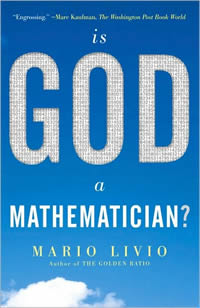Book Notes
 Mario Livio, Is God a Mathematician? (New York: Simon and Schuster, 2009), 308pp.
Mario Livio, Is God a Mathematician? (New York: Simon and Schuster, 2009), 308pp.
My high school algebra teacher, Mr. Hamilton, did his best, but math has never been one of my strengths. My wife and I joke that we helped our kids with their math homework until the numbers dropped out. But even though I didn't understand much of Mario Livio's book, I still enjoyed it. Livio is a senior astrophysicist and head of the Office of Public Outreach at the Hubble Space Telescope Science Institute in Baltimore. His several books that have popularized difficult issues of math and science have won numerous awards.
Why is math so successful in explaining the world? There's a mystery in the "omnipresence and omnipotent powers of mathematics," says Livio, most famously expressed by the Nobel laureate Eugene Wigner (1902–1995) who spoke of the "unreasonable effectiveness of mathematics." This book, then, is not about God or religion, but about Wigner's conundrum. Why does math, which is a product of our human minds and independent of experience, so perfectly describe the physical world? Consider its power of prediction to tell us exactly when and where a comet will appear a thousand years from now. The physical world seems to obey these mathematical laws, our human brains are themselves physical organs, and yet we perceive and understand the world of math. Is math something that humans have invented, an arbitrary and artificial construction, or is it something embedded in reality that we discover? If aliens from another world visited earth, would they by necessity have to use our math to describe reality?
After an introductory chapter, Livio explores the history and nature of math in three chapters about six thinkers — Pythagoras and Plato, Archimedes and Galileo, and then Descartes and Newton. Math, it seems, is the very grammar of the universe and reality itself. Its practical applications are almost endless, from the architecture of Egyptian pyramids to describing the ocean tides, planetary orbits, stock market behavior, the statistical distribution of major league batting averages, casino gambling, population genetics, linguistics, and the arcane field of "knot theory." After presenting the idea that math appears to be discovered and not invented, in the latter chapters he explores the opposite position ("formalism"), that math, as Poincaré put it, is merely "definitions in disguise." By the end of the book he suggests that we might be asking the wrong question, and that there are elements of both invention and discovery. Either way, Livio's book does a marvelous job explaining the sheer power and beauty of math, which must indeed be part of the mind of God.


